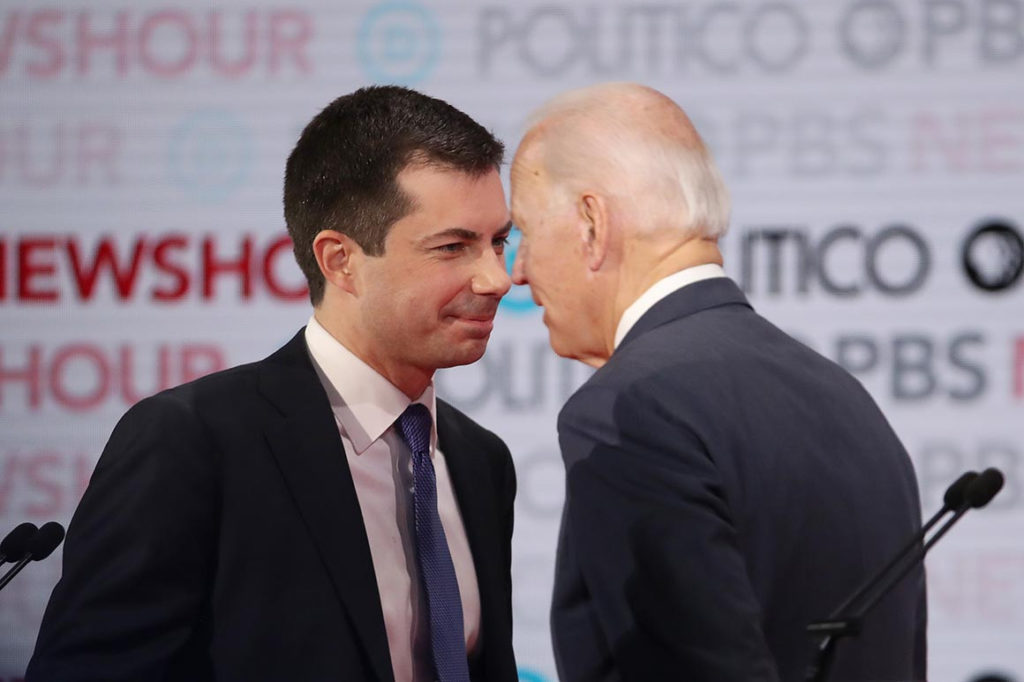By Ruby Van Dyk || Assistant Managing Editor

Photo Courtesy of Politico
This last week in the Iowa Caucuses, Mayor Pete Buttigieg proved himself to be a candidate to beat in the Iowa Caucuses, collecting 26.2% of the vote as of last Friday. Since the start of his campaign a year ago,Mr. Buttigieg has had a meteoric rise, and much of this makes sense. Sometimes likened to Barack Obama, Buttigieg’s way of speaking is calm, eloquent, and deliberate. He’s both a graduate of Harvard and a Rhodes Scholar. He is openly gay, and a military veteran who was once deployed to Afghanistan. All of this on paper seems to be a perfect storm of a candidate for democrats. But in reality, Buttigieg has a big problem: young progressives (including myself) aren’t rooting for him.
According to a recent poll conducted by Forbes-Zogby last month, Mayor Pete ranks last place amongst the candidates in terms of support from both Millennials and Generation Z. The poll was comprised of voters between the ages of 18-29, and of those voters, only 3% said that their preferred candidate was Buttigieg. This poll aligns with much of what I’ve been hearing from many of my left-wing friends and fellow college students as well: Pete isn’t their candidate. It’s clear that Buttigieg is an accomplished, educated, and well intentioned candidate who would clearly make a much better alternative to who is clearly in office. So why is this? Well, I have some theories.
First, Buttigieg simply is not progressive enough. Although he is certainly a liberal democrat, in comparison to other candidates like Warren and Sanders, Buttigieg seems moderate. He does not support medicare for all or waiving tuition and creating free public college. His climate change plan is not as prgoressive as the Green New Deal, and he takes money from corporate donors. All of these are issues that have defined the political opinions of young people, including myself. The stances Mayor Pete has taken are too moderate. He’s making an argument for the status-quo, to go back to a pre-trump, Obama-esque era. I want more, and so do many other young progressives.
Secondly, he’s changed his views. At first Buttigieg praised Medicare for all, but now he openly criticizes it and the effects it may have on private insurance companies. He used to advocate for progressive and even radical ideas such as overhauling the supreme court and removing the filibuster, but not anymore. In contrast to a candidate like Bernie Sanders who has been unwavering in his positions for the last 40 years, this makes Mayor Buttigieg look fickle. Young people are looking for candidates with consistency, and the fact that Buttigieg has flip-flopped on quite a few key issues is troubling. He came out swinging hard as a left wing progressive but has now aligned himself as a younger alternative to the former Vice President Biden’s moderatism.
Thirdly, we’re worried about his ability to beat Trump. Buttigieg polls extremely poorly amongst black voters, who are a core demographic of the democratic party’s base. He also lost a bid for the DNC chair in Indiana in 2017, which is concerning. So yes, he did well in Iowa, but how will he perform in Michigan? How will he do in Pennsylvania? These are the states that Democrats lost in the last presidential election. It is crucial that the Democratic candidate has a real and concrete chance against the republican candidate in these battleground states. I worry about the appeal of Buttigieg’s argument in comparison to that of Trump’s. Right now the economy is doing extremely well, which will be a core part of the President’s pitch for re-election to the American people. Having said that, the seemingly strong economy is still built in the favor of the wealthy and the powerful. Yes, jobs are being added, but many of them are minimum wage and require people to work three positions at a time. Our country is incredibly unequal. Corporations and elites rule. In order to effectively fight Trumpism in November, we need a candidate with a stronger argument against our economic status quo than the one Buttigieg is making.
But lastly, I’m skeptical of Buttigieg because he seems like a moderate candidate disguised as a young progressive. He’s 38, which is closer to college students’ age than any other candidate in the American history, but his policies and positions are more aligned with the democratic party of my grandparents’ generation. Young progressives are looking for a structural change, and Pete Buttigieg simply isn’t going to deliver that.
Junior Ruby Van Dyk is the Assistant Managing Editor. Her email is rvandyk@fandm.edu